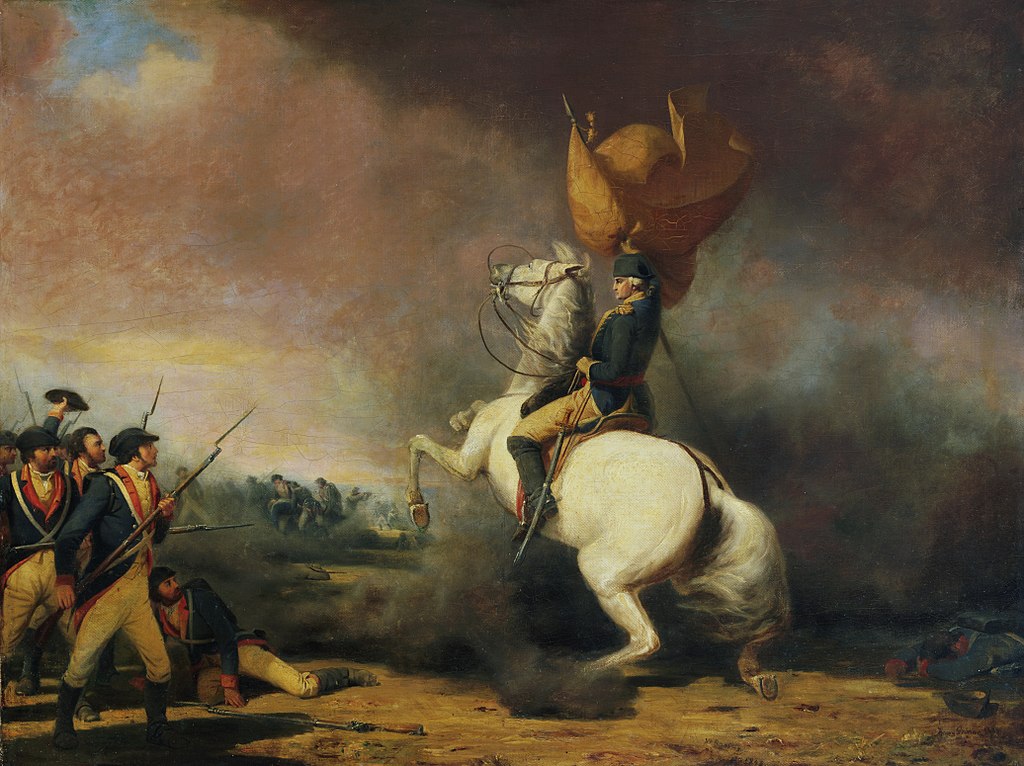By George F. Will
June 5, 2019

General Washington rallying his troops at Princeton (William Ranney)
“By the rude bridge that arched
the flood,
the flood,
Their flag to April’s breeze
unfurled,
unfurled,
Here once the embattled farmers stood
And fired the shot heard round
the world.”
the world.”
— Ralph Waldo Emerson,
“Concord Hymn”
“Concord Hymn”
After the morning bloodshed on Lexington green, on the first day of what would become a 3,059-day war, there occurred the second of what would be eventually more than 1,300 mostly small military clashes. Rick Atkinson writes: “A peculiar quiet descended over what the poet James Russell Lowell would call ‘that era-parting bridge,’ across which the old world passed into the new.” Here again is Atkinson’s felicity for turning history into literature.
Many who have read his Liberation Trilogy on U.S. forces in World War II’s European theater (“An Army at Dawn,” “The Day of Battle,” “The Guns at Last Light”) will already have immersed themselves in his just-published “The British Are Coming: The War for America, Lexington to Princeton, 1775-1777,” the first of what will be his Revolution Trilogy. It is a history of the combat in which the fate of a continent, and an idea, was determined by astonishingly small numbers of combatants, and one astonishing man.
As London came to terms with the fact that Boston is farther from Charleston than London is from Venice, it slowly dawned on Britain’s government that it was fighting not just a nascent army but also a nation aborning. And that it had the daunting, and ultimately defeating, logistical challenge of maintaining an army across an ocean in the age of sail. When its North American commander asked London for 950 horses, more than 400 died en route and others, weakened by the voyage, died on shore.
America’s shores — most Americans lived within 20 miles of Atlantic tidewater — were home to people made restive, then violently belligerent by a vibrant print culture: “Philadelphia . . . boasted almost as many booksellers — 77 — as England’s top 10 provincial towns combined.” The war would be won largely by the deft retreating of George Washington, who, as Atkinson demonstrates, several times came “within a chin whisker of losing the war.”
Approximately 250,000 Americans served for some period in some military capacity, and more than 1 in 10 died, a higher proportion of the nation’s population than perished in any conflict other than the Civil War. They died from battle, disease or vile British prisons. Few battles produced mass carnage. (One in 8 of the British officers who would die in the eight years of war died in four hours at Bunker Hill.) Inaccurate muskets (Atkinson says, “The shot heard round the world likely missed”) often were less lethal than the primitive medicine inflicted on the victims of muskets, cannons and bayonets. Only the fortunate wounded got “their ears stuffed with lamb’s wool to mask the sound of the sawing.” Amputations above the knee took 30 seconds; about half the amputees survived the ordeal or subsequent sepsis.
Washington rarely had more than 20,000 soldiers and often had fewer: On one December day during his late-autumn 1776 retreat from New York City across New Jersey, he lost about half his “threadbare and dying” army to expiring enlistments, and he crossed the Delaware into Pennsylvania with fewer than 3,000. Later that month, however, he recrossed the river with 2,400 and in less than two hours at Trenton (where Lt. James Monroe was wounded) and, eight days later, in an hour at Princeton, saved the idea of a continental nation based on republican ideals.
One lesson of “The British Are Coming” is the history-shaping power of individuals exercising their agency together: the volition of those who shouldered muskets in opposition to an empire. Another lesson is that the democratic, sentimental idea that cobblers and seamstresses are as much history-makers as generals and politicians is false. A few individuals matter much more than most. Atkinson is clear: No George Washington, no United States.
Washington, writes Atkinson, learned that “only battle could reveal those with the necessary dark heart for killing, years of killing; that only those with the requisite stamina, aptitude, and luck would be able to see it through, and finally — the hardest of war’s hard truths — that for a new nation to live, young men must die, often alone, usually in pain, and sometimes to no obvious purpose.” The more that Americans are reminded by Atkinson and other supreme practitioners of the historians’ craft that their nation was not made by flimsy people, the less likely it is to be flimsy.
Read more from George F. Will’s archive or follow him on Facebook.
Read more:
No comments:
Post a Comment